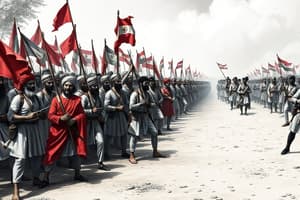Podcast
Questions and Answers
What was one of the key economic causes of the Revolt of 1857?
What was one of the key economic causes of the Revolt of 1857?
- Britain's implementation of free trade policies with India
- India's dominance in the global textile market
- India's use as a source of raw materials for British industries (correct)
- Britain's support for Indian artisan communities
Who were some of the different groups that joined the Revolt of 1857 aside from the sepoys?
Who were some of the different groups that joined the Revolt of 1857 aside from the sepoys?
- Only peasants
- Peasants, zamindars, and erstwhile rulers (correct)
- Only zamindars
- Only religious leaders
What was one of the impacts of British economic policies on Indian industries?
What was one of the impacts of British economic policies on Indian industries?
- Strengthening of local craftsmanship
- Increase in job opportunities for artisans
- Decline in Indian industries and joblessness among artisans (correct)
- Enhanced competition leading to innovation
What change did the public realize was necessary in India after the Revolt of 1857?
What change did the public realize was necessary in India after the Revolt of 1857?
What was one of the major causes of discontent among the peasants and zamindars in Bengal?
What was one of the major causes of discontent among the peasants and zamindars in Bengal?
What did the absentee landlords who bought land at auctions mainly focus on?
What did the absentee landlords who bought land at auctions mainly focus on?
Why did many peasants become landless laborers bonded for life to landlords and moneylenders?
Why did many peasants become landless laborers bonded for life to landlords and moneylenders?
What upset the educated Indians in terms of employment opportunities during British rule?
What upset the educated Indians in terms of employment opportunities during British rule?
During Lord Bentinck's governor-generalship, what social and educational reforms were introduced by the British in India?
During Lord Bentinck's governor-generalship, what social and educational reforms were introduced by the British in India?
How did many Indians perceive the introduction of English-medium education by the British?
How did many Indians perceive the introduction of English-medium education by the British?
Flashcards are hidden until you start studying
Study Notes
Economic Causes of the Revolt of 1857
- The exploitation of Indian resources and the destruction of Indian industries were major economic causes of the Revolt of 1857.
Groups Involved in the Revolt of 1857
- Sepoys, peasants, zamindars, and other social groups joined the Revolt of 1857.
Impact of British Economic Policies on Indian Industries
- The British economic policies led to the decline of Indian industries, such as textiles, and the loss of employment opportunities for artisans.
Post-Revolt Realization
- The public realized that a change in the system of governance was necessary in India after the Revolt of 1857.
Cause of Discontent among Peasants and Zamindars
- The expropriation of land by the British and the exploitation of peasants and zamindars by the British-created landholding system led to discontent among them in Bengal.
Focus of Absentee Landlords
- Absentee landlords who bought land at auctions mainly focused on extracting maximum revenue from the land.
Cause of Peasants' Bonded Labor
- Many peasants became landless laborers bonded for life to landlords and moneylenders due to the exploitation of the landholding system and the burden of debt.
Employment Opportunities for Educated Indians
- Educated Indians were upset by the limited employment opportunities available to them in the British administrative system, which favored British officials.
Social and Educational Reforms during Lord Bentinck's Governor-Generalship
- The British introduced social and educational reforms, such as the abolition of sati and the promotion of English-medium education, during Lord Bentinck's governor-generalship.
Perception of English-Medium Education
- Many Indians perceived the introduction of English-medium education as a means of cultural imperialism and a way to create a class of Indians who would serve the British interests.
Studying That Suits You
Use AI to generate personalized quizzes and flashcards to suit your learning preferences.




